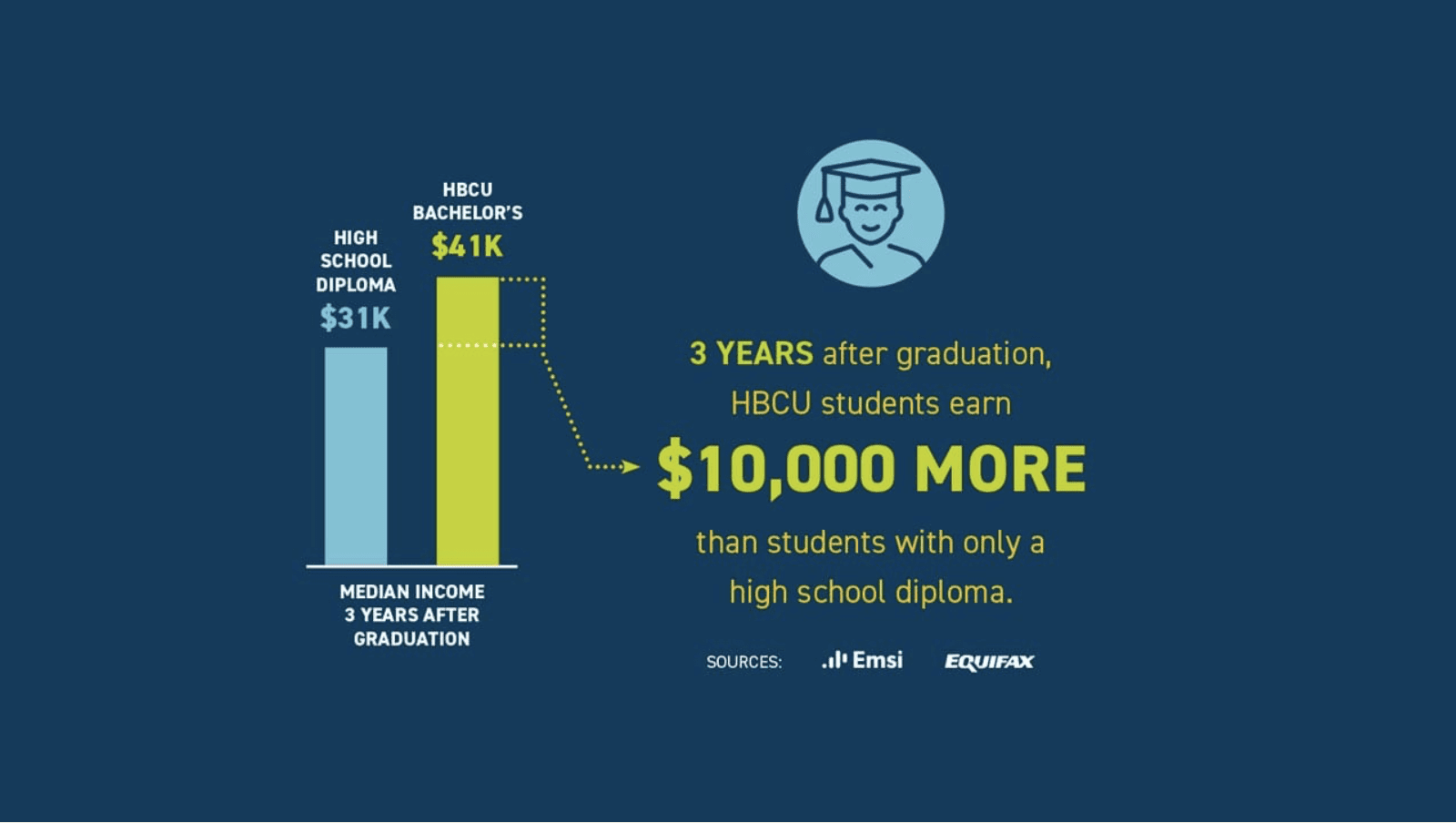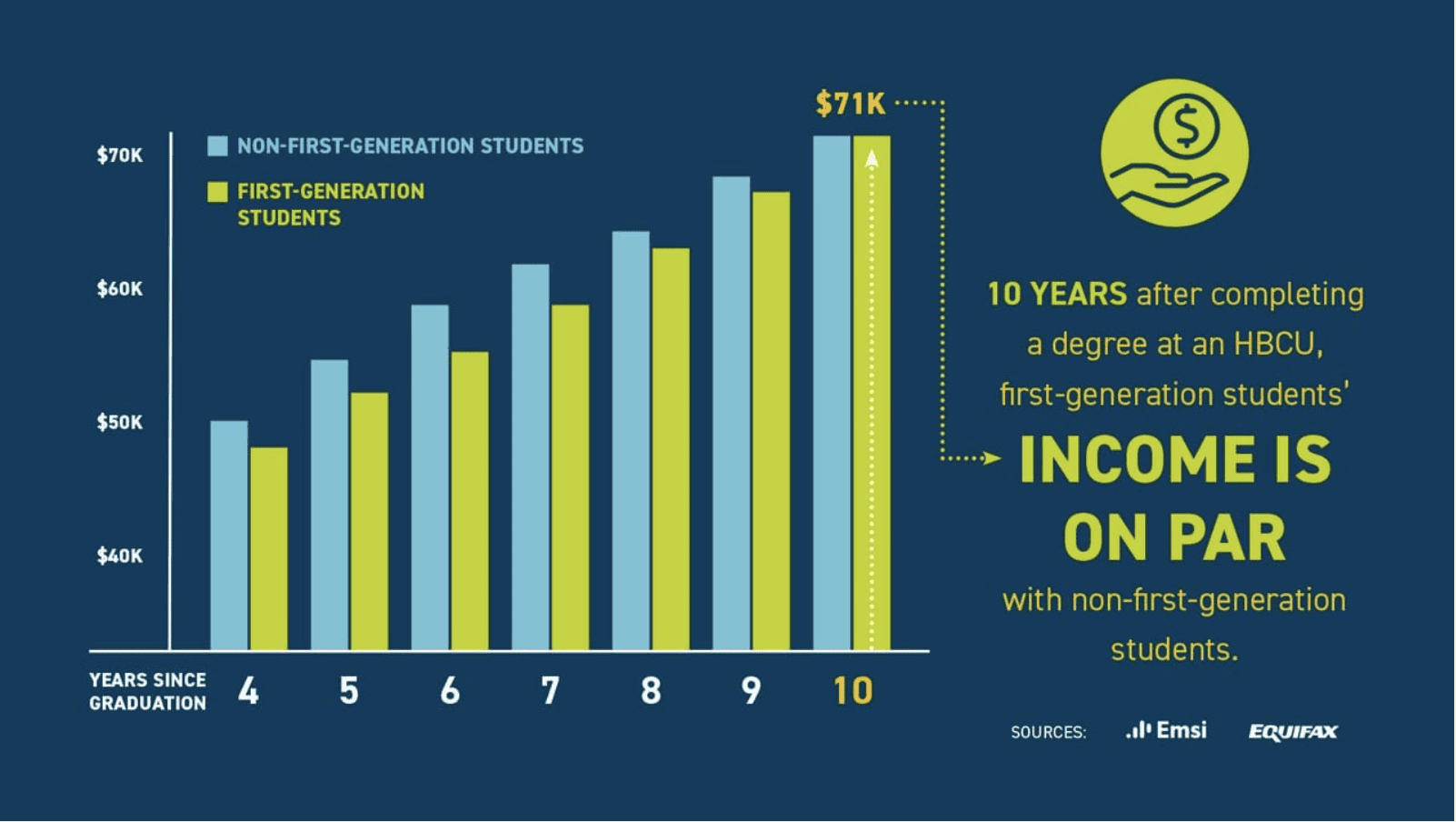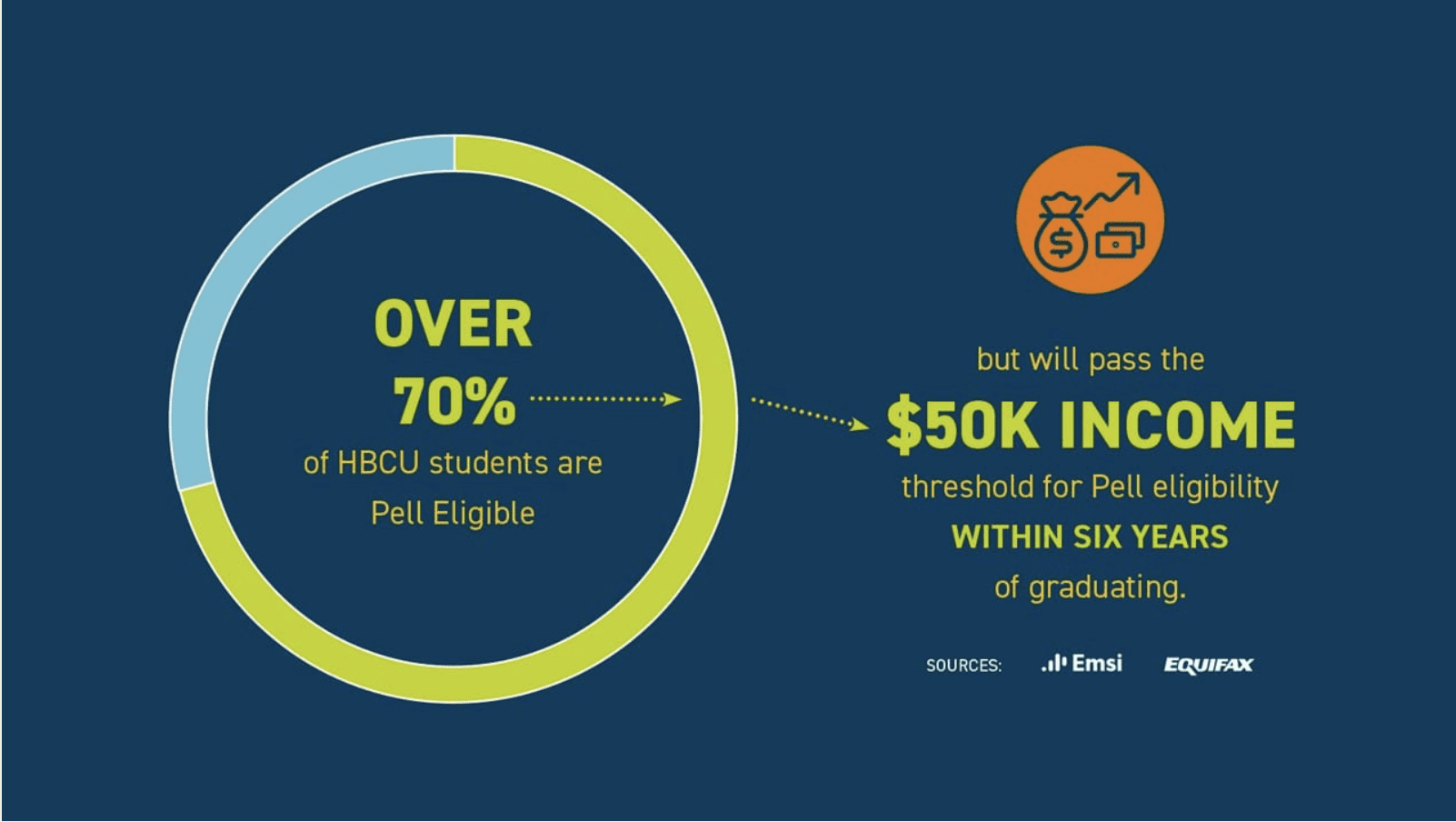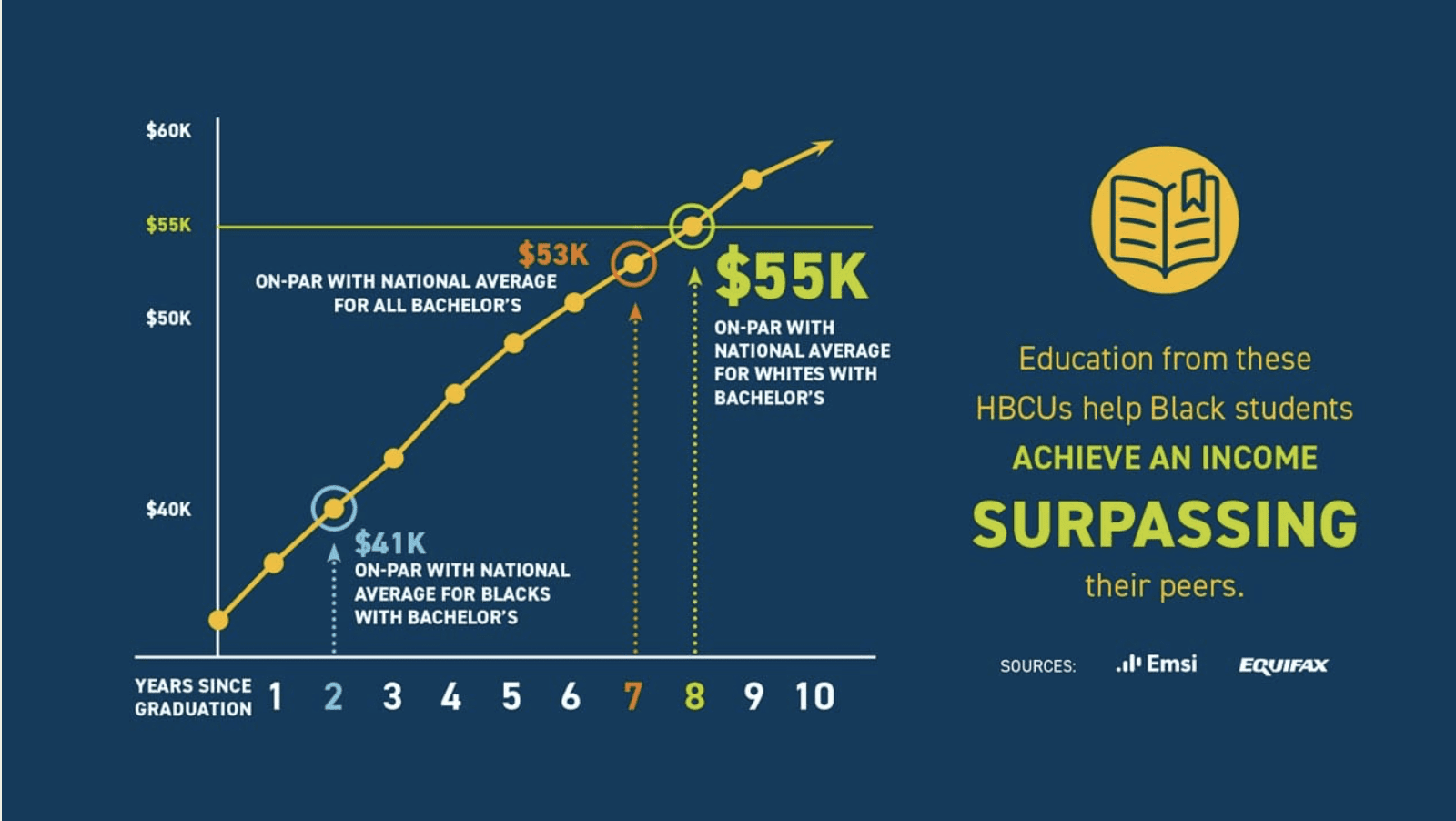INNOVATE
Uncovering More of our HBCU Truth: UNCF Introduces "The HBCU Effect"®
Over the subsequent century and a half, HBCUs have been indispensable to the larger Black experience in America, simultaneously shaping the broader tapestry of the country. Despite attacks that question their purpose in today’s society, they are beloved by those who are their beneficiaries. Despite never having adequate resources, they have continued to educate a significant portion of America’s Black middle class. And despite the constant myths and mistruths that constantly circulate about them, HBCUs press forward with a mission as urgent today as it was 150 years ago. Their steadfast mission to serve underserved communities was evident in the wake of the COVID-19 pandemic as HBCUs across the nation mobilized to provide shelter, operate food pantries and offer financial relief for not only their students, but local communities. As they have in the past, HBCUs today continue to give back to the community at large in more ways than just through education.
These vital institutions, and the communities they serve, deserve more accurate portrayals, deserve more resources and deserve to have their full purpose and impact shared and explained responsibly. In our efforts to serve these institutions, students and communities, UNCF through its Frederick D. Patterson Research Institute (FDPRI) launched a body of work called “The HBCU Effect,” with the purpose of housing and distributing HBCU-focused research studies.
“The HBCU Effect”® demonstrates the historical and present-day impact of institutions that, despite being tremendously under-resourced—combating historical underfunding, inadequate endowments, biased media messaging that either ignores the institutions or lazily reports uniformed and inaccurate information with little to no context of institutional history, inequitable data reporting practices, and serving largely underserved populations—continue to successfully serve a substantially low-income and first-generation student population which has largely been left behind by the K-12 system. HBCUs consistently overproduce, accounting for only 3% of public and not-for-profit institutions, yet enroll almost 10% of African American college students nationwide, while yielding 17% of the bachelor’s degrees and a quarter of the STEM degrees earned by Black students.
Decades of historical and contemporary research tell us that HBCUs have been and continue to be the catalyst for educational, economic, cultural and societal gains for African Americans and, to a degree, the rest of the nation and the world. Preparers of the Black professional class, providers of economic opportunity in their communities, molders of cultural originality and cauldrons of intellectual unrest that spurred the evolution of American society, HBCUs have been among the most American of institutions by educating citizenry who have held the country accountable to its founding ideals and principles.
At this moment in the country’s history and given the nature of the public discourse related to social justice, UNCF believes understanding the work of HBCUs is increasingly critical—especially in light of the incomplete portrayals of HBCUs—as the world seeks the example of institutions that have been toiling in the face of significant opposition since their founding. They are a light in the darkness, or in this case, they are “The HBCU Effect.”®
Current and Upcoming Research
To highlight the under-researched ideas, FDPRI, through a partnership with EMSI/Equifax, gathered support arguing the necessity to learn more about HBCUs and their outcomes. Data from a 2019 study of private and public HBCUs highlighted a few important outcomes. First, data demonstrated the value of a college education in helping Black students climb the economic ladder, revealing that just three years after graduation, HBCUs students earn $10,000 more annually than students with only a high school diploma. Similarly, the data shows that just as HBCUs greatly affect the socio-economic mobility of their students. Data illustrates that though 70% of HBCU students are federal Pell Grant-eligible, on average, HBCU graduates’ incomes surpass the Pell eligibility threshold (being $50,000) just six years after graduating, demonstrating the positive effect HBCUs have on intergenerational socio-economic mobility.
Even more compelling, FDPRI found that HBCUs are closing persistent outcomes gaps with first-generation colleges students. Though first-generation students often have a more difficult time navigating college and securing a job upon graduation, within a decade of completing their degree first-generation graduates’ incomes are on par with non-first-generation graduates, and in some cases surpass the median income levels of their non-first-generation peers.
To further explore these initial findings, FDPRI launched a series of studies in 2020 with the intent to release some preliminary analysis of data in the form of articles, blog posts, podcasts, opinion pieces, reports and essays that present a counternarrative establishing HBCUs at the center of African American success and higher education innovation. These will validate and promote a complete picture of HBCUs, highlighting the value and competitiveness of the storied institutions.
A few studies slated to be released in 2021 and 2022 include a collaboration with Opportunity Insights from Harvard University to understand more about the economic mobility of African American students at HBCUs; a partnership with the Association of American Medical Colleges to explore the connections between HBCUs and outcomes for Black doctors; an HBCU alumni study of peer network development and workforce outcomes; and finally, an oral history research study documenting HBCU involvement in social justice movements.
Unlike the cadre of deficit-focused articles circulating about HBCUs, the reporting of these studies will include contextualized and disaggregated data which considers student body, history and purpose. In other words, data that isn’t correctly used and corrected to account for the differences in student populations causes HBCUs look less successful than they really are—undermining the HBCU value proposition. Bad data, as “The HBCU Effect”® points out, often supports funding mechanisms which largely punish HBCUs for serving low-income students of color.
As yet another tool in the toolbox, FDPRI has created “The HBCU Effect.”® The goal is not only to present a counternarrative that situates HBCUs at the center of Black American success and higher education innovation, but also to serve as a model of equitable higher education research for a field with growing interest in better serving students of color. And, that is an innovation that truly delivers impact to enable better futures for us all.





